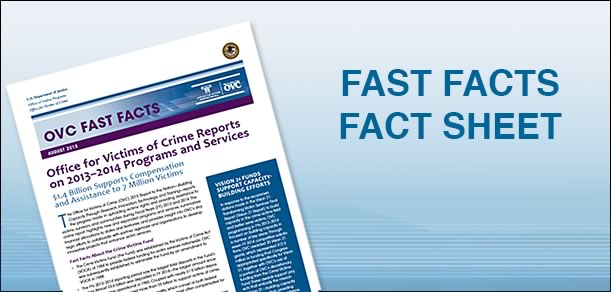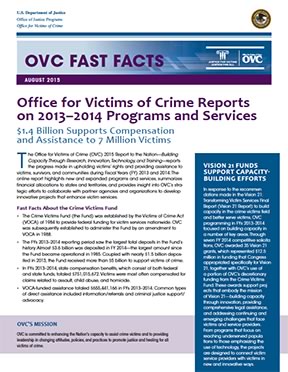INTRODUCTION
The mission of the Office for Victims of Crime (OVC) is to enhance the Nation’s capacity to assist crime victims and to provide leadership in changing attitudes, policies, and practices to promote justice and healing for all victims of crime.
As indicated in its mission statement, OVC is committed to building the capacity of crime victim services. During the 30 years following the passage of the Victims of Crime Act (VOCA) of 1984, the victim services movement has grown from a patchwork collective of individuals in disparate communities to an established professional field. This maturation of policies, practices, and programs has allowed victim service professionals to reach more victims—and help them rebuild their lives—than ever before. Justice for victims has become entrenched as policy not only in the criminal justice system but also throughout a wide range of professional disciplines—from social work to criminal justice and rape crisis counseling to law enforcement.
Although this progress is significant, we must continue to enhance services to address ongoing needs and emerging challenges. An estimated 6.1 million people experienced violent victimizations and 16.8 million individuals experienced property victimizations in the United States in 2013.1 Victims, their families, and their communities often experience devastating physical, psychological, emotional, and financial consequences of these crimes. In FYs 2013 and 2014, the Crime Victims Fund (Fund) provided more than $1.4 billion to support direct assistance to more than 7 million crime victims through a variety of services—from emergency food and shelter to crisis counseling and advocacy—as well as compensation for financial losses associated with the crime. Recipients of these services included victims of VOCA-designated priority crimes—domestic violence, sexual assault, and child maltreatment—and an array of other crimes that cause harm to individuals, families, and communities throughout the Nation.
The obligation limitation on the Fund was set at $730 million in FY 2013 and $745 million in FY 2014. In FY 2015, the obligation limitation on the Fund will be approximately $2.36 billion. This greatly increased obligation limitation—the largest ever—will support efforts to move the victim services field forward into a new era of enhanced and innovative victim services. OVC is grateful that Congress recognizes the necessity of expanding the Fund’s obligation limitation, which will allow greater numbers of victims to receive direct services and enable more victim service providers to build their capacity to reach victims and serve them effectively.
The Need for Capacity Building
The victim services field must continue to evolve if it is to build and sustain capacity. Faced with a rising number of new and complex issues for victims—in addition to longstanding challenges—and the corresponding need to serve more victims, OVC in 2010 conducted the Vision 21: Transforming Victim Services Initiative, the first extensive examination of the victim assistance field in almost 15 years. The results of this comprehensive 2-year study were published in 2013 in the Vision 21: Transforming Victim Services Final Report (Vision 21 Report), which addressed the political, policy, and philosophical challenges of transforming victim services in the 21st century. To drive this transformation, the Vision 21 Report provided four key recommendations:
- Conduct continuous rather than episodic strategic planning in the victim assistance field to effect real change in research, policy, programming, and capacity building.
- Support the development of research to build a body of evidence-based knowledge and generate, collect, and analyze quantitative and qualitative data on victimization, emerging victimization trends, services and behaviors, and enforcement efforts.
- Ensure the statutory, policy, and programmatic flexibility to address enduring and emerging crime victims’ issues.
- Build and institutionalize capacity through an infusion of technology, training, and innovation to ensure that the field is equipped to meet the demands of the 21st century.
This holistic approach to improving the capacity of the field is necessary to reach underserved victim populations, assist survivors more effectively, and provide increasingly complex services.
The victim services field will develop and institutionalize its capacity to reach and serve all crime victims in need of help and support in the 21st century.

Implementation of Capacity Building
In response to the Vision 21 Report’s recommendation to build capacity in the crime victims field to better serve victims, OVC programming in FYs 2013 and 2014 focused on building capacity in a number of key areas. Through seven FY 2014 competitive solicitations, OVC awarded 35 Vision 21 grants, which represented $12.5 million in funding that Congress appropriated specifically for Vision 21, together with OVC’s use of a portion of OVC’s discretionary funding from the Crime Victims Fund. These awards support projects that embody the mission of Vision 21—building capacity through innovation, providing comprehensive legal assistance, and addressing continuing and emerging challenges that face victims and service providers. From programs that focus on reaching underserved populations to those emphasizing the use of technology, the projects are designed to connect victim service providers with victims in new and innovative ways.
During FYs 2013 and 2014, OVC also expanded its training opportunities for the victim services field. Of particular note was our partnership with the U.S. Department of Defense (DOD) to respond to sexual assault in the military. Through a collaboration with DOD’s Sexual Assault Prevention and Response Office (SAPRO), OVC continues to educate both military and community-based victim service providers through in-person trainings, offered both on and near military installations with high rates of sexual assault, and online trainings to help ensure that victims receive comprehensive and compassionate care.
Vision 21 revealed that we need more empirical information about victimization to serve victims more effectively. Basic questions about who is victimized, by whom, and what services survivors seek need answers. OVC is supporting a number of efforts conducted by our partner federal agencies to collect and analyze such data, which will enable policymakers and victim service organizations to develop programming and implement projects to meet victims’ needs. OVC recognizes the increasing role that innovative technology plays in our society—especially with its capacity to serve victims in new ways. Victim service providers and the VOCA state administering agencies must build organizational capacity to support data collection and support victims through new and innovative means that still protect their rights to confidentiality and safety. OVC is focused on helping the field reach victims in all communities, no matter how underserved or isolated, and is funding programs that prioritize doing so. In FY 2014, OVC funded programs to develop mobile applications, or ‘apps,’ and increase use of social media to provide victims with information about available services through methods that work best for them.
But the benefits of technology also come with drawbacks. From child pornography and cyber stalking, to labor and sex trafficking, to identity theft and financial fraud, criminals can use technological advancements to perpetrate new crimes—and commit heinous acts in new ways. In addition to ‘new’ embodiments of crime, familiar challenges persist, such as child abuse, domestic violence, and sexual violence. OVC continues to support innovative methods of serving victims to meet these emerging and enduring forms of victimization.
The crime victim services field faces many challenges as it continues to advance victims’ rights and help victims begin to heal. Service providers must fully understand the needs of victims, develop new means of connecting with survivors, and provide them with assistance in ways that work best for them. During FYs 2013 and 2014, OVC began implementing the strategic framework of the Vision 21 Report by launching new programs, expanding the scope of existing initiatives, and continuing collaboration with partner agencies and organizations to develop innovative projects to enhance victim services. This Report to the Nation describes OVC’s accomplishments during Fiscal Years 2013 and 2014 as we continue our commitment to Building Capacity Through Research, Innovation, Technology, and Training and turning the goals of Vision 21 into reality.










